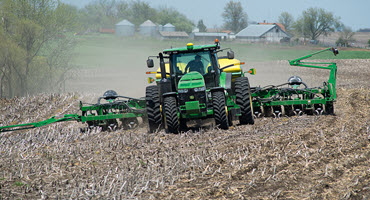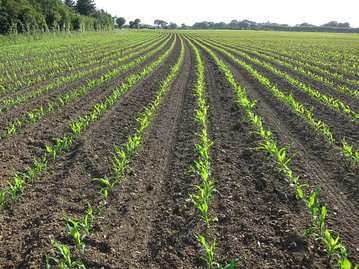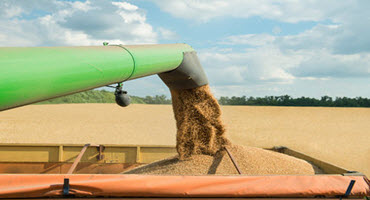Current figures ahead of the five-year average
By Diego Flammini
Assistant Editor, North American Content
Farms.com
American soybean producers will soon be finished planting their 2017 crop, according to the United States Department of Agriculture’s Weekly Weather and Crop Bulletin for the week of June 4 to 10.
92 percent of the national soybean crop is in the ground, according to the latest figures. That number is up from the 87 percent average measured over the past five years.
Of the 18 states surveyed, the top two are South Dakota and Minnesota. Each reported 99 percent of their soybean crop planted.

Kentucky has the lowest percentage of soybeans planted, reporting 73 percent seeded. But that number is still above the five-year average of 68 percent.
77 percent of the national soybean crop has emerged, according to the USDA. That number is slightly higher than the 73 percent five-year average.
Louisiana and Mississippi are the top states in terms of emergence with 96 and 92 percent reported, respectively.
On the lower end, Kentucky reported 51 percent of its soybean crop emerged.
The USDA’s National Agricultural Statistics Service (NASS) rated more than half of the national soybean crop as good. Only 9 percent of the crop is rated as excellent.
Mississippi leads all states in terms of crop condition, with 18 percent of the state’s soybean crop ranked as excellent.
Corn
Nationally, 94 percent of the total corn crop is emerged, which is on par with the five-year average.
North Carolina, Nebraska, Iowa and Illinois reported more than 90 percent of their corn crop has emerged.
Of the 18 states documented, Michigan’s corn emergence is the lowest at 83 percent. That number is down 10 percent from the five-year average.

The NASS ranked 57 percent of the total U.S. corn crop is ranked as good, Another 10 percent is rated as excellent.
29 percent of the corn crop in Tennessee is ranked as excellent. And 84 percent of the corn in Colorado is ranked as good. Both states are the highest in the respective categories.
Winter Wheat
92 percent of the total U.S. winter wheat crop is headed, according to the USDA’s report. That number is up 1 percent from the five-year average.
Arkansas, California, Illinois, Missouri and North Carolina are among the states to report 100 percent heading.
Only 28 percent of the winter wheat crop in Idaho is headed, down from a five-year average of 58 percent.
Nationally, farmers have combined 17 percent of the winter wheat crop, according to the report. That number is up from a five-year average of 15 percent.

To date, farmers in Texas have harvested 72 percent of their winter wheat crop, up from a five-year average of 38 percent.
The NASS rated 42 percent of the total winter wheat crop as good. Another 8 percent is rated as excellent.
Oregon’s 25 percent excellent winter wheat crop is the highest of the 18 states surveyed.
Spring Wheat
95 percent of the total U.S. spring wheat crop has emerged, according to the USDA report. That number is slightly above the 92 percent average measured over five years.
Of the six states surveyed, only Minnesota and South Dakota reported their spring wheat has fully emerged.
The NASS reported 22 percent of Minnesota’s spring wheat crop as excellent, the highest of the documented states.
To date, the NASS ranked 7 percent of the spring wheat crop as excellent.
Fieldwork Days
The states with the most suitable fieldwork days as of June 11 were:
Arizona and Utah – 7
Illinois – 6.9
Iowa and California – 6.8
Ohio – 6.7
The states with the fewest number of suitable workdays were:
Alabama and Georgia – 4.2
Mississippi – 4.1
New Hampshire and Rhode Island – 4
Louisiana – 2.5
Weekly Precipitation Levels as of June 11
State | Precipitation (inches) | Station |
Illinois | 0.08 | Rockford |
Indiana | 0.42 | Fort Wayne |
Iowa | 0.02 | Cedar Rapids/Waterloo |
Kentucky | 1.35 | Jackson |
Michigan | 0.42 | Muskegon |
Missouri | 0.86 | Columbia |
New York | 2.49 | Binghamton |
Ohio | 0.99 | Columbus |
Pennsylvania | 1.36 | Wilkes-Barre |
Tennessee | 1.86 | Memphis |
The next Weekly Weather and Crop Bulletin is scheduled for release on Tuesday, June 20.